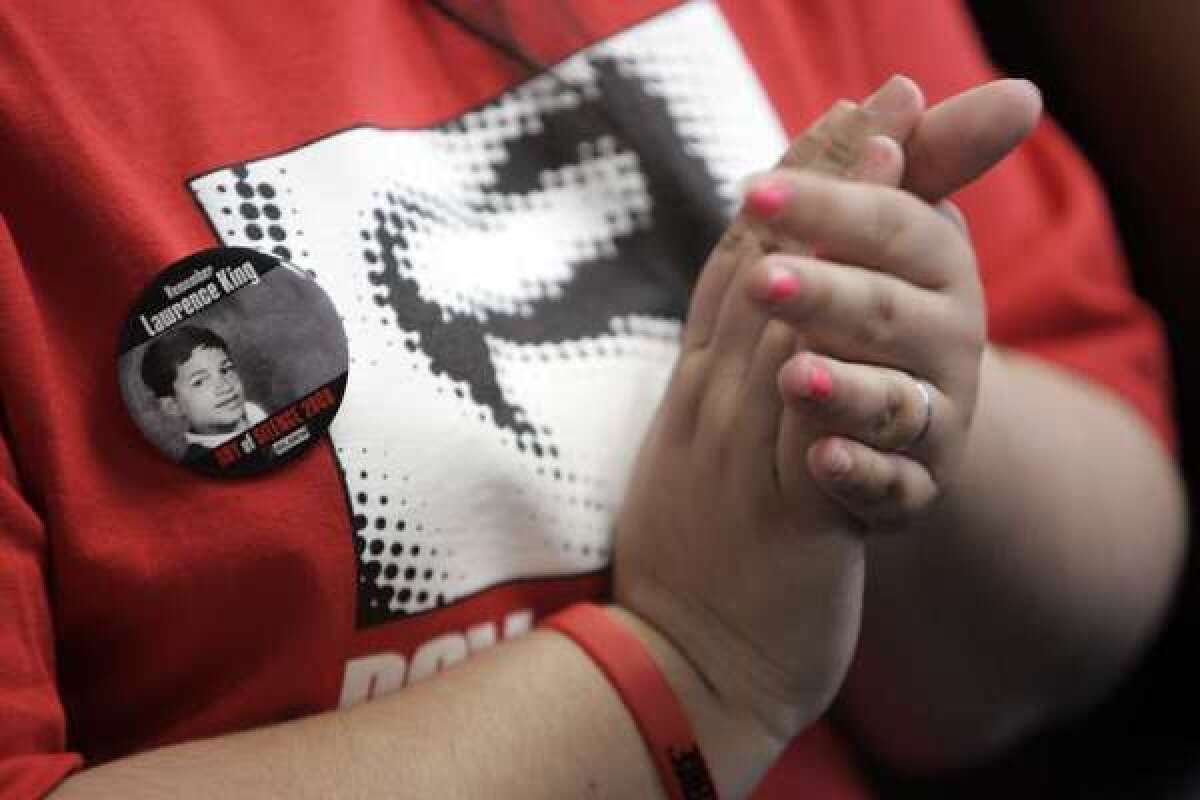When anti-gay bullying and free speech collide

- Share via
As Congress revisits federal education policy, gay rights activists are pressing for the enactment of the Student Non-Discrimination Act of 2013, which would prohibit harassment of students in public schools “on the basis of actual or perceived sexual orientation or gender identity.” Laws already on the books prohibit discrimination in public schools on the basis of race, color, national origin and gender. The new act would seem a natural extension.
But the bill is sure to be opposed by conservatives who see anti-bullying efforts as a Trojan horse for the “gay agenda” and a threat to free speech. The first assertion is true -- in the sense that anti-bullying efforts that explicitly mention sexual orientation do assume that gay students are entitled to be treated with dignity. But that “agenda” is one that only bigots would oppose.
The free-speech argument is more complicated, but fortunately the legislaton’s sponsors have anticipated it.
The bill defines ‘‘harassment’’ to include “acts of verbal, nonverbal, or physical aggression, intimidation, or hostility.” No one would argue that a gay student should have to endure in-your-face slurs from classmates. But here’s a harder case from the 1st Amendment standpoint. What if a Christian student wears a T-shirt with a “Homosexuality Is Shameful’’ message on the back and this message on the front: “Be Ashamed, Our School Embraced What God Has Condemned.’’?
I didn’t make that scenario up. It comes from a court case seven years ago in California. In that case, the U.S. 9th Circuit Court of Appeals upheld the punishment of the student who wore the shirt as a protest against his school’s “Day of Silence” held to encourage tolerance of gay students.
Other courts have ruled differently in cases involving anti-gay speech by students. In 2001, the U.S. 3rd Circuit Court of Appeals in Philadelphia struck down the anti-harassment policy of a school district that had been challenged by two Christian students who wanted to “speak out about the sinful nature and harmful effects of homosexuality.”
Writing for the court, Judge Samuel A. Alito Jr. (now a Supreme Court justice) said that “there is no categorical harassment exception to the 1st Amendment’s free speech clause.” Alito cited a landmark 1969 Supreme Court decision in favor of students who wore black armbands to school to protest the Vietnam War. In that ruling, the court said that student speech could be suppressed only when it “materially disrupts classwork or involves substantial disorder or invasion of the rights of others.”
The tension between school anti-harassment policies and the 1st Amendment isn’t limited to speech about homosexuality. The U.S. Department of Education has been criticized (including by The Times) for a new “blueprint” for punishing sexual harassment on college campuses that is so broad that critics say it could be used to punish a student who made a lame sexual joke or a professor who quoted from “Lolita.”
But homosexuality in general, and same-sex marriage in particular, are contested issues in political discourse, although public opinion is quickly moving toward acceptance of both. If a student has the right to express an opinion about U.S. military action, it’s hard to see how he can be silenced when he wants to pipe up about the undesirability of gay marriage -- even though a gay classmate may find that opinion offensive.
Maybe the Supreme Court went off the rails in 1969 when it declared that schoolchildren don’t “shed their constitutional rights to freedom of speech or expression at the schoolhouse gate.” But given that precedent, and the current controversy over the federal government’s sexual harassment guidelines, it’s important that the nondiscrimination bill not be derailed by free-speech concerns.
To disarm such objections, the bill declares: “Nothing in this act shall be construed to alter legal standards regarding, or affect the rights available to individuals or groups under other federal laws that establish protections for freedom of speech and expression, such as legal standards and rights available to religious and other student groups under the 1st Amendment to the Constitution and the Equal Access Act.” (The Equal Access Act requires schools to allow student religious clubs to meet on school property on the same basis as other groups.)
This language doesn’t go into detail about the extent of students’ free-speech rights, leaving unclear whether the legal standards it adopts are those of the 9th Circuit (no anti-gay T shirts) or the 3rd Circuit (allowing anti-gay sermonizing on the playground). But it’s robust enough to preempt arguments that protecting gay kids from bullying and harassment means silencing their classmates.
ALSO:
Fair trial for George Zimmerman
Stay calm and let the NSA carry on
Mako shark catch: Record-setting outrage
More to Read
A cure for the common opinion
Get thought-provoking perspectives with our weekly newsletter.
You may occasionally receive promotional content from the Los Angeles Times.







